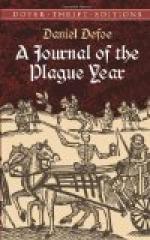For the security of those northern traders, the coal ships were ordered by my lord mayor not to come up into the Pool above a certain number at a time; and[302] ordered lighters and other vessels, such as the woodmongers (that is, the wharf keepers) or coal sellers furnished, to go down and take out the coals as low as Deptford and Greenwich, and some farther down.
Others delivered great quantities of coals in particular places where the ships could come to the shore, as at Greenwich, Blackwall, and other places, in vast heaps, as if to be kept for sale; but[303] were then fetched away after the ships which brought them were gone; so that the seamen had no communication with the river men, nor so much as came near one another.[304]
Yet all this caution could not effectually prevent the distemper getting among the colliery, that is to say, among the ships, by which a great many seamen died of it; and that which was still worse was, that they carried it down to Ipswich and Yarmouth, to Newcastle-upon-Tyne, and other places on the coast, where, especially at Newcastle and at Sunderland, it carried off a great number of people.
The making so many fires as above did indeed consume an unusual quantity of coals; and that upon one or two stops of the ships coming up (whether by contrary weather or by the interruption of enemies, I do not remember); but the price of coals was exceedingly dear, even as high as four pounds a chaldron;[305] but it soon abated when the ships came in, and, as afterwards they had a freer passage, the price was very reasonable all the rest of that year.
The public fires which were made on these occasions, as I have calculated it, must necessarily have cost the city about two hundred chaldron of coals a week, if they had continued, which was indeed a very great quantity; but as it was thought necessary, nothing was spared. However, as some of the physicians cried them down, they were not kept alight above four or five days. The fires were ordered thus:—
One at the Custom House; one at Billingsgate; one at Queenhithe, and one at the Three Cranes; one in Blackfriars, and one at the gate of Bridewell; one at the corner of Leadenhall Street and Gracechurch; one at the north and one at the south gate of the Royal Exchange; one at Guildhall, and one at Blackwell Hall gate; one at the lord mayor’s door in St. Helen’s; one at the west entrance into St. Paul’s; and one at the entrance into Bow Church. I do not remember whether there was any at the city gates, but one at the bridge foot there was, just by St. Magnus Church.
I know some have quarreled since that at the experiment, and said that there died the more people because of those fires; but I am persuaded those that say so offer no evidence to prove it, neither can I believe it on any account whatever.




